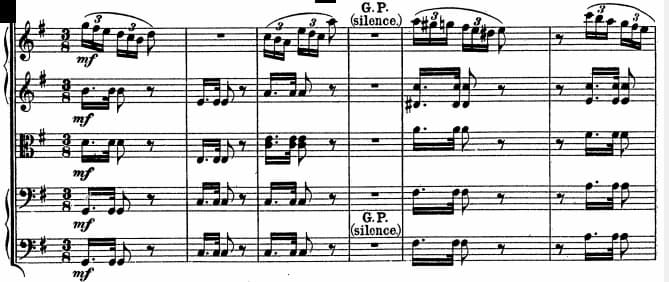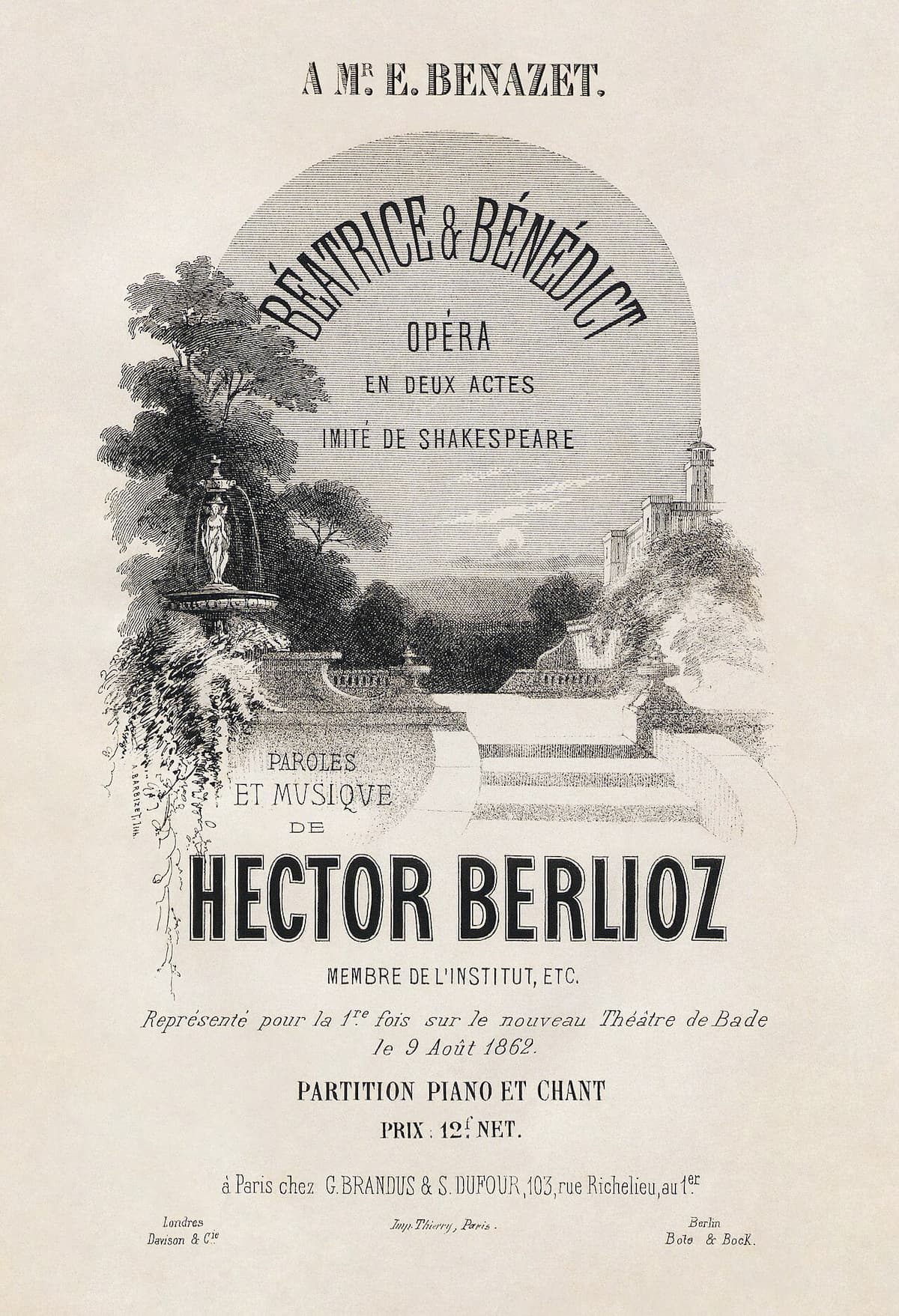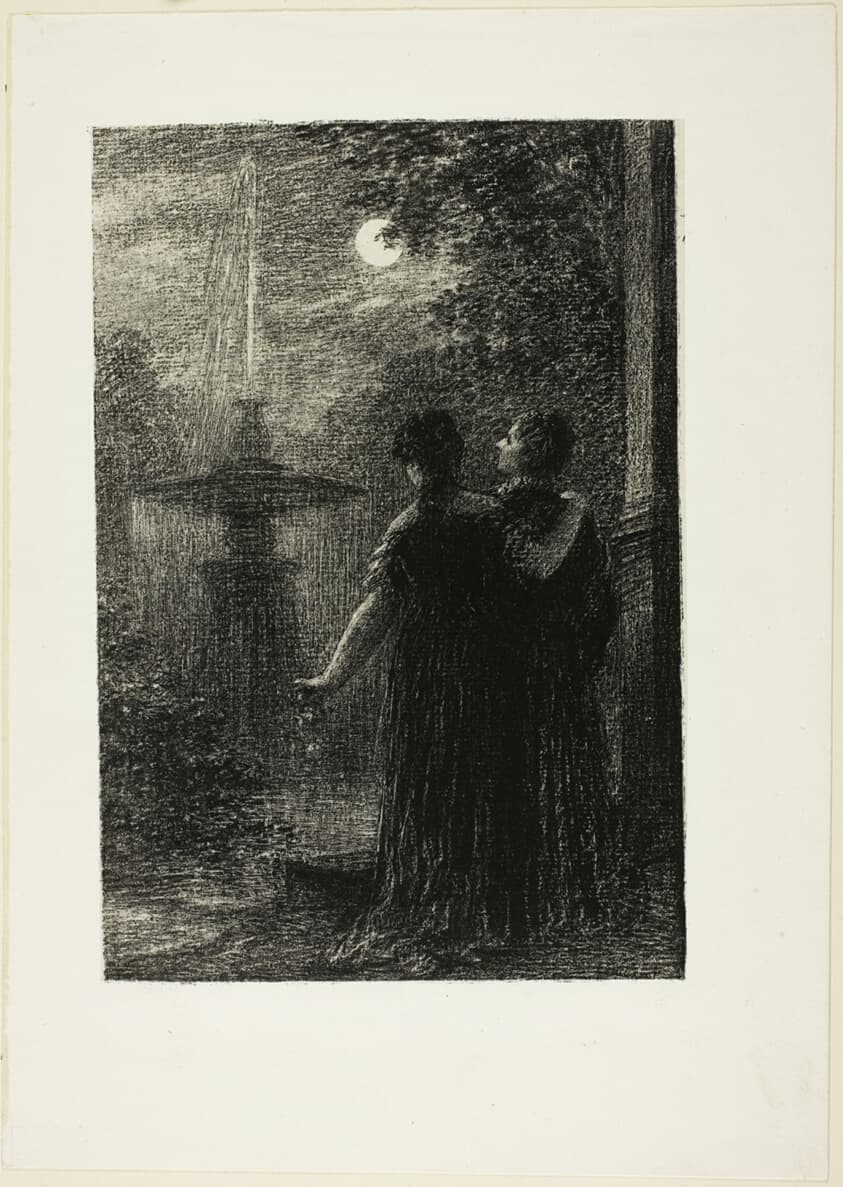Hector Berlioz (1803-1869) completed only three operas during his lifetime. By all accounts, Benvenuto Cellini was an outright failure, with the audience hissing at most of the music after the first few numbers. And the epic Les Troyens (The Trojans) was so large in scale that it was never staged in its entirety during his lifetime. Only his last opera, Béatrice et Bénédict, based on Shakespeare’s comedy Much Ado About Nothing, was a success at its premiere on 9 August 1862 in Baden-Baden. Sadly, it did not enter the regular operatic repertoire, but it has enjoyed some popularity in recent decades.
Hector Berlioz: Béatrice et Bénédict “Overture”
Genesis

Hector Berlioz’s Béatrice et Bénédict (Glyndebourne Festival Opera)
In his Memoirs, Berlioz tells us that he wrote the opera at the request of M. Bénazet, the director of the casino at Baden-Baden. Berlioz did conduct the premiere, and a few months later it was staged in Weimar at the request of the Grand Duchess, in German translation. The composer reports, “their Highnesses had invited me to come and conduct the first two performances, and as ever lavished on me generosities of every kind.”
Critics had come all the way from Paris on the occasion of the first performance and generally praised the music. “A few thought there was a good deal of clutter in the rest of the score and found the spoken dialogue lacking in wit. The spoken dialogue is taken almost word for word from Shakespeare’s text.” Berlioz did indeed fashion the French libretto, and the general outline is based on a subplot from Shakespeare’s comedy.
Hector Berlioz: Béatrice et Bénédict “Viens, de l’hyménée”
The Plot, Act I

Hector Berlioz’s Béatrice et Bénédict overture opening
The opera is set in the Sicilian town of Messina, where citizens gather to welcome Don Pedro, prince of Aragon, who is returning from a successful military campaign. Governor Léonato arrives with his niece Béatrice and his daughter Héro, who eagerly anticipates the return of her beloved Claudio, Don Pedro’s comrade in arms. As soon as the troops arrive, the wedding of Héro and Claudio is announced for that evening. Béatrice, in the meantime, has a very different kind of reunion with another soldier, Bénédict. In fact, they trade insults, as they have in previous meetings and tease each other.
Bénédict swears to Claudio and Don Pedro that he will never marry. His friends, however, conspire to trick them into admitting their love for one another. They stage a conversation for Bénédict to overhear, during which Léonato tells Pedro that Béatrice loves Bénédict. Upon hearing this, Bénédict admits to himself that he loves Béatrice and resolves to pursue her. Meanwhile, Héro and her attendant Ursule play a similar trick on Béatrice, who now believes that Bénédict is secretly in love with her.
Hector Berlioz: Béatrice et Bénédict “Vous soupirez, madame!”
The Plot, Act II

Hector Berlioz’s Béatrice et Bénédict score title page
At the wedding celebration for Héro and Claudio, the local music teacher Somarone leads the guests in song. Everybody is elated except Béatrice, who admits to herself that she is in love with Bénédict. However, she is not entirely sure if she wants to give up her freedom. With Héro and Ursule, she sings about the happiness of the bride about to be wed. As Héro is summoned to her wedding, Béatrice runs into Bénédict, and they both attempt to conceal their love for each other.
As Claudio and Héro sign their marriage contract, the notary produces a second contract and asks if another couple wishes to be married. Béatrice and Bénédict confess their true feelings and sign the wedding contract, declaring that today a truce is signed but that we will be enemies again tomorrow.
Hector Berlioz: Béatrice et Bénédict “Je vais d’un cœur aimant”
The Music

Hector Berlioz’s Béatrice et Bénédict Act 1
The Overture to Béatrice et Bénédict is still the most celebrated musical number from the opera. Loosely structured, it characterises the substance of the opera by alluding to a number of passages to follow. Berlioz considered the duet between the two young women “Vous soupirez, madame!” the trio of Héro, Béatrice and Ursule “Je vais d’un cœur aimant” and the great aria of Béatrice “Dieu! que viens-je d’entendre?” his most successful creations. And while the score is difficult to perform, particularly in regards to the men’s roles, for Berlioz it “was one of the liveliest and most original scores that I have written.”
With Béatrice et Bénédict, Berlioz turned away from Virgilian tragedy and light-heartedly returns to Italian subject matter and the music of street dances, tambourines, and guitars. The character of the music teacher Somarone is Berlioz’s invention, and the line “This piece which you are about to have the honour to perform is a masterpiece,” apparently was uttered by Spontini during rehearsals of Olimpie in Berlin. Berlioz was well aware that the work might face some stiff resistance from theatre directors, especially in Paris. “After all,” he writes, “the music is not suitable for Parisians.”
For more of the best in classical music, sign up for our E-Newsletter
